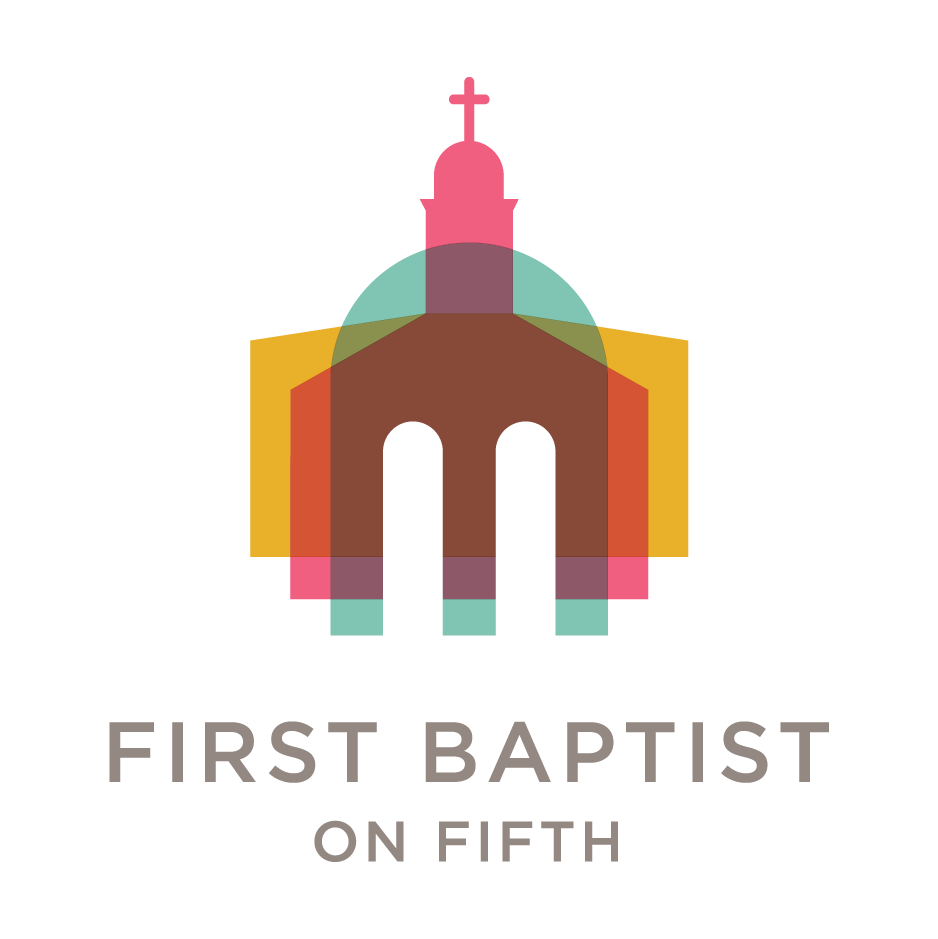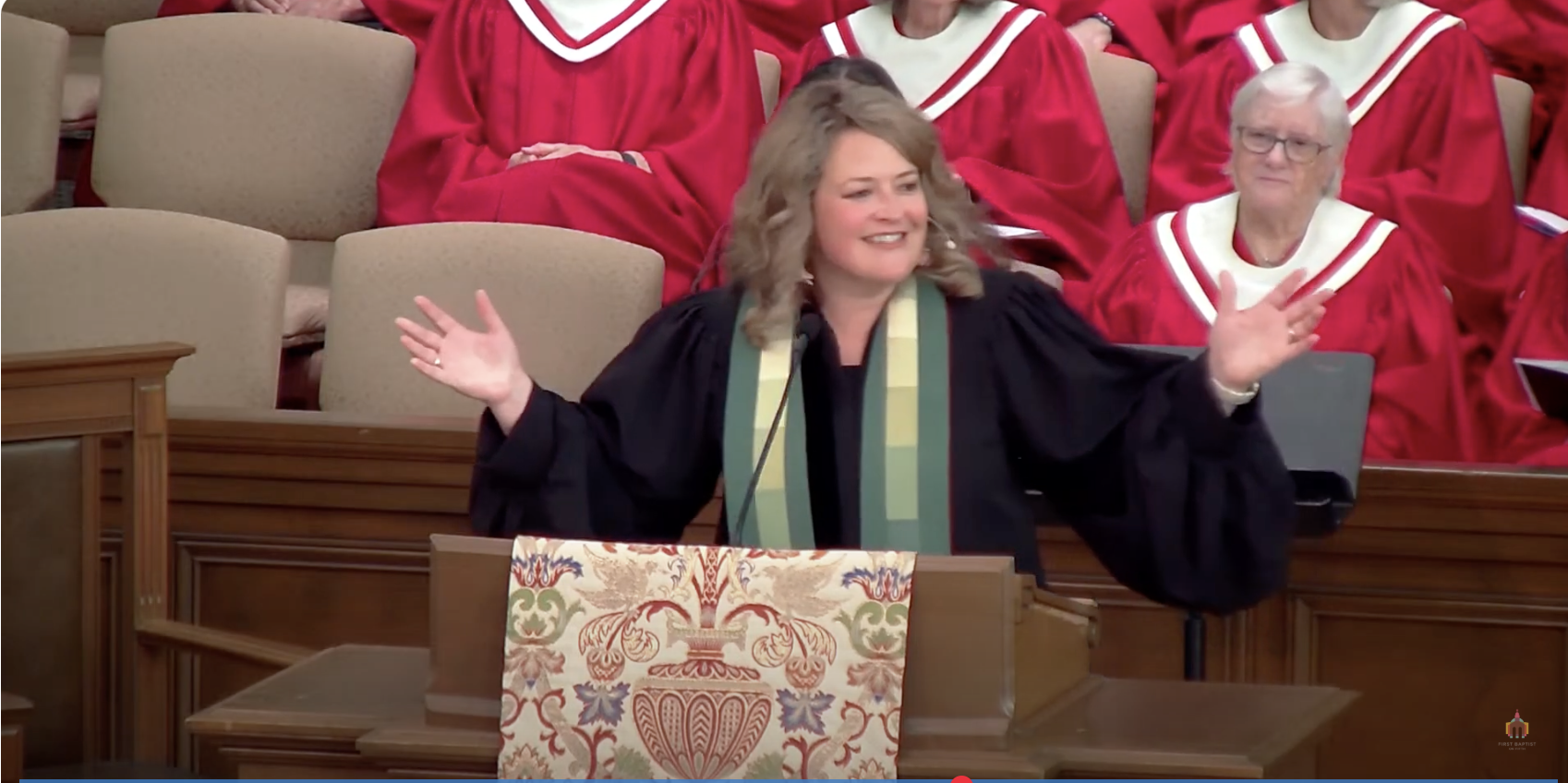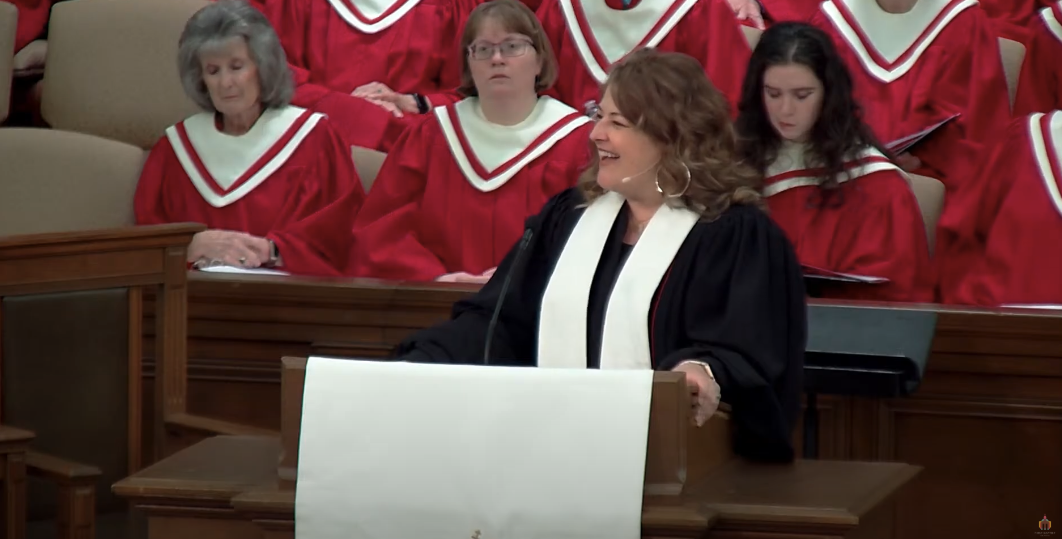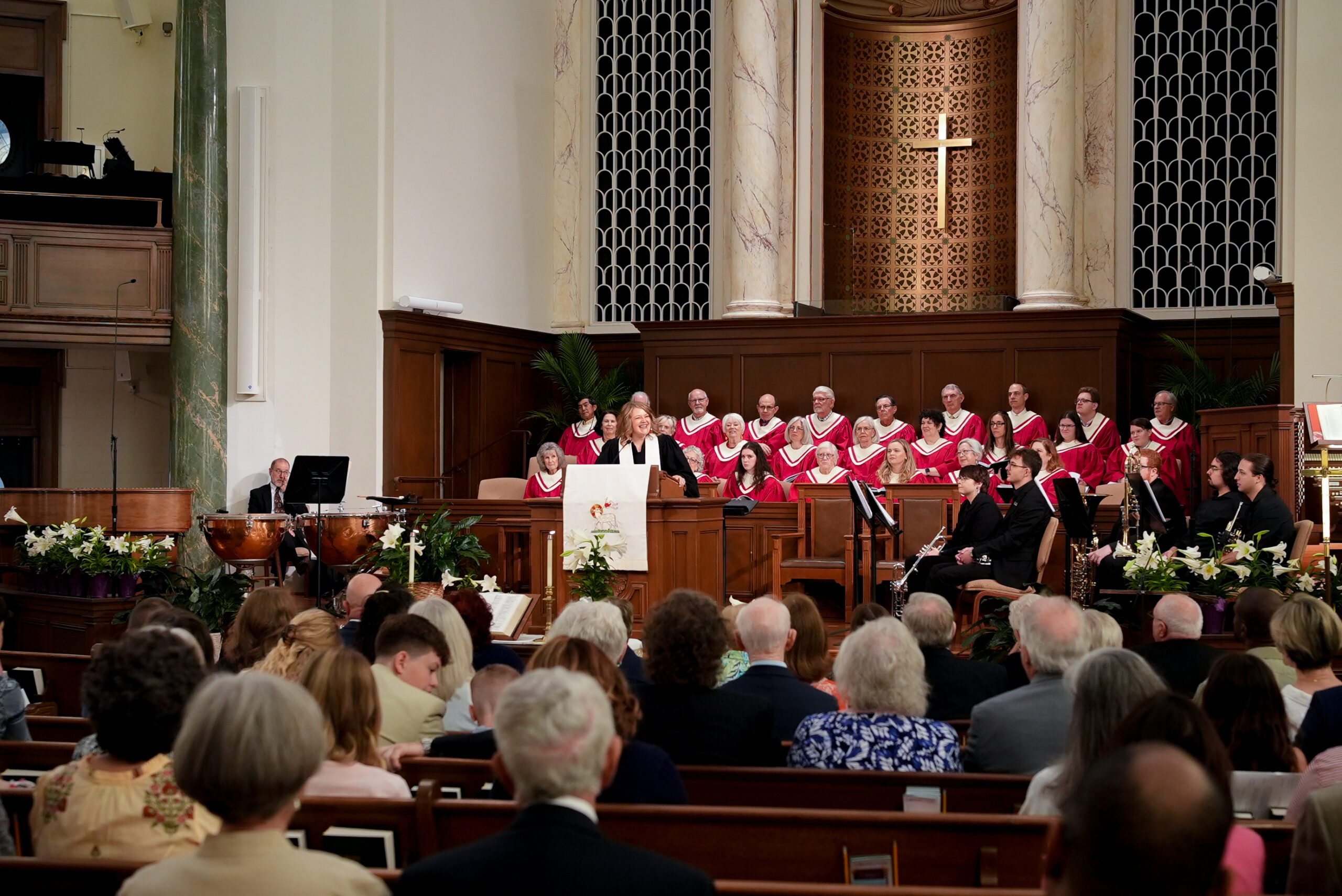IBack in the summer of 2019, I traveled with our youth to Passport
Camp. That year, Passport was held at my alma mater after all (go Paladins!),
and any chance to be with our teenagers who I so loved, among the camp I so
loved, on the campus of Furman which I so loved – well, that was just the
actual best.
After everyone wakes up, and rubs sleep out of blurry eyes, and
stumbles to breakfast, Passport youth camp begins all together with Morning
Celebration, sort of a ‘pep rally meets dance party meets wake up call meets
Jesus.’ These 30 minutes set the tone for the day of Bible study, mission
projects, fun and fellowship, and worship. So on the first morning of Morning
Celebration, as we made our way into Furman’s McAlister Auditorium, you
could feel the pent-up energy among us all. I was ready – had my camp shirt
on, my backpack ready, my Starbucks in hand – until I saw the signs plastered
on every single door leading into the Auditorium: “no drinks allowed.”
Now I’m someone who mostly follows the rules, but guys: it was my
first cup of coffee, and I’d only had a sip or two! And I’m at youth camp, for
crying out loud! Coffee is non-negotiable. So I started bargaining with the
signs in my head: “I know McAlister Auditorium like the back of my hand; I
practically lived in here as a music major at Furman (ahem, 20 years ago, but
still!) And I’m a mom of three! I’m almost always carrying multiple items,
most which don’t belong to me, most regularly something liquid. I mean, dear
God, I’m a grown woman of 40 years old. I think I can handle a cup of coffee.
Surely those signs are really meant for the campers, not the 40-somethings.”
So the doors opened, and in we strode into McAlister, I –
surreptitiously – with coffee in hand, only partially trying to conceal it. Our
group settled into our row, probably 20 rows back from the front, behind a
host of campers and leaders. The room was electric, a year’s worth of pent-up
Passport energy finally released. Hundreds of campers are up and moving,
hitting beachballs around the room and dancing the “Church Clap” and the
“Waka-Waka,” both camp favorites. And as we crashed, flushed and hyped,
back into our chairs to prepare for the devotion – of course you see where
this is going – I accidentally tipped over my “almost-full-except-for-a-
couple-of-sips” cup of coffee and watched in absolute horror as it gushed
down the slanted floor to the stage. I looked aghast as kids and leaders
realized that hot coffee was coursing under their shoes, a hot brown river
soaking their backpacks, lapping over anything they had dared set on the
ground. My face inflamed immediately into a hot crimson, and of course I’m
sweating, in this, one of the most mortifying moments of my life, sure I’m
about to be dragged on stage and made an example AS I SHOULD BE.
Wishing a giant hole would just open up and suck me down, I instead stepped
out on the walk of shame down front to find a Passport staffer and confess
my Starbucks sin, feeling every eye on me in disgust. (Pretty sure one of my
ministerial colleagues whose backpack was drenched in my coffee is still mad
at me.) And as I fumbled through my words and profuse apologies, in my
flustered state, I actually said out loud to this poor staffer now saddled with
my mistake the thing I had thought only in my very own head: I didn’t think
those directions applied to me!
Following directions, huh? Not for the faint of heart, let me tell you!
Especially when the faint of heart think themselves above the need.
IIWe’re back with Jesus in the Sermon on the Mount, nearing the
conclusion of these lessons along the way. They’re lessons, as we’ve learned
over these months, about how we live into the coming kingdom of God, how
we treat each other and posture ourselves, how we pray and lead and love
and give.
Today’s passage is brief, two warnings sounded by Jesus about the
challenges and risks of kingdom living: the first about the direction we should
follow, and the second about how to discern our leader along the way. There
are two options, Jesus tells us. Which path might you take?
“The gateway into God’s dream for this world is a narrow one,” Jesus
tells his listeners. “There’s a wide and easy road that many will take, and
narrow and rough road that few will follow. The hard road is the road that
leads to life.” Jesus’ hearers would think of Jeremiah, of course, and his
warning to the people of Israel: “see I am setting before you the way of life
and the way of death.” Two paths, and only one you will choose. And the way
of the kingdom, Jesus makes clear, is a narrower path. It’s not for everyone.
This way of the kingdom asks you to do God’s work of Love in this world, and
sometimes that’s just hard work to do. It isn’t always congruent with the ways
of this world: ways of status and efficiency, of disposability and discord, of
self-protection and self-sufficiency. The way of the kingdom is a way of
reconciliation and grace, of sabbath and compassion, where last are first, and
least are essential, and the good of the whole is always prioritized over the
good of the one. Yes, this way applies to you. Will you take it?
“There are two kinds of leaders,” Jesus continues, “ones that seem as
gentle and wise as sheep, but instead are ravenous like wolves; and others
that are good and fruitful like trees. You’ll know them by their fruits.” Jesus
reminds the hearer that appearance and reality are not always congruous, to
be alert to what lies beneath one’s shiny exterior and always evaluate based
on the real effects of one’s life. Look for the fruit, Jesus says, mixing his
metaphors to evoke the image of a tree, flush with grapes and figs and all that
nourishes and sustains. The path of God’s kingdom asks you to live in such a
way that your very life becomes full of the Spirit’s fruits: love, joy, peace,
patience, kindness, goodness, faithfulness, gentleness, and self-control. It
doesn’t always prioritize the ways that get certain ones ahead of others, ways
of charisma and charm, of power and preference. Yes, this discernment
applies to you. Will you follow?1
IIITwo types of paths and two types of guides, Jesus says. Next week, we’ll
hear about the two types of foundations upon which we build.
But oh how we know the easy way and the bitter fruit. Instead of loving
our enemies, oh how much easier it would be if we could dismiss our enemies,
discarding those who differ from our politics, our way of life, our theology,
our priorities without guilt or grief. Instead of making things right, oh how
much easier it would be if we could ignore the problems, evade the truth,
soften the blows, coddle the cantankerous. Instead of trying to be salt and
light in the world, oh how much easier it would be if we could just make our
money and build our houses and work our jobs and take our trips and read
our books and live our lives, all without worrying about the impact of our
choices. Instead of seeking reconciliation and forgiveness, oh how much
easier it would be if we could just cancel those who make us mad, announcing
with glee that we’re done with the one who betrayed our trust, the one who
failed us yet again, the one whose very presence belies all we think matters in
the world, the one whose bad decision became the emotional equivalent of
spilled coffee all over our bag – now ours to clean up and make right. Instead
of trying to attend to our body, and mind, and heart, and soul in such a way
that we know our fruit will be good, oh how much easier it would be to just
consume fast food for our bodies, our minds, our hearts, and our souls. Life is
already hard enough, we say. Discernment is difficult enough, we say. Can’t
we take the easy street and the mediocre fruit a time or two?
Or even when we’ve built up a more heightened awareness to live our
Christian lives away from that easy street or mediocre fruit, we’re not
immune to the lessons still. You know, actually I think these two warnings are
representative of one of the challenges that plague longtime Christians the worst. I’ll call it “I-already-know-that”-ism… or maybe “I-don’t-need-
the-directions”-itis. “I-already-know-that”-ism suggests that there are parts of the Christian life we pretty well think we’ve got covered. “I-already-know
-that”-ism can look at some of the harder challenges of Jesus (like loving your
enemies or taking up your cross) and recognize these as lifelong lessons to
learn, but then look to others (like love God, love your neighbor, pray, give,
sacrifice, forgive) and think, “you know, I do those things pretty well, I
generally live my life as a good and kind person, I don’t do anything flagrantly
wrong – no murders over here! – so you know, I know what it means to be a
Christian, at least worthy enough of a B+ on the final exam!”
“I-don’t-need-the-directions”-itis wants to direct the hard stuff to the
people that really need it. “Don’t come to me and tell me to ‘be imitators of
God,’ or ‘clothe myself in compassion,’ we Christians say. “I learned those a
long time ago! Go tell Uncle Phil over there – have you heard what conspiracy
theories he’s been saying recently? – or give that message to the annoying lady
at my doctor’s office who will not put my call through to the right people! I’ve
been at this a long time, guys. I got it. I teach Sunday School, I have my Bible
on my nightstand, I follow some famous Christians on Facebook, I pick up a
few extra items at the grocery for Crisis Control – heck, I’ve even served on
the Policy Committee at church! I don’t need you to tell me again; these
directions are for the other people, not for me.”
“I-already-know-that”-ism and “I-don’t-need-the-directions”-itis sound
familiar, don’t they? They keep us from examining our beliefs and
assumptions and can further harm people in our life without even realizing it.
They might start innocently enough, and from a generally good-hearted
place, but over time, can become like death by 1000 paper cuts, one spilled
cup of coffee at a time. That’s the best case scenario. But then think of those
who learned long ago that the Bible said, “women are to be silent in the
church,” or that “slaves should obey their masters,” or that “homosexuality is
an abomination,” and then refuse any nuance or context or further awareness
of these words because “I already know this” and “I don’t need the directions,”
remember? Their path is set!
And after awhile, we realize we’ve sidled over to the easy way, where
the road is big and broad and cluttered with disease and dis-ease. After
awhile, we find that the actual guides of our lives – those whose voices set
our agenda and to which we measure our days – come more from the books
we read, the podcasts we hear, the news we consume, the movies we watch, the accounts we follow, than perhaps even Jesus himself. After awhile, we
may even realize that the life we’re living isn’t the life of discipleship at all.
IVThe late Black theologian Howard Thurman liked to tell a story of his
grandmother, a former enslaved person. For in her growing up years, she
remembered two services for the enslaved every Sunday. The first was
organized by the master, where the appointed preacher proclaimed each
week of the instructions, in his words, that God gave on how to be a better
slave. The second service came after the formal first, where all who were
enslaved would “steal away to Jesus.” There, they’d hear another sermon, one
that shared a different path, one preached not by wolves but by another
shepherd. And how did they know? Because this one ended with the words:
“you are not slaves, you are the children of God.”2
VFriends, I want to encourage all of us today to lay down that which we
think we’ve got figured out and that which we perceive we don’t need
directions for. Instead, pick up a map. Discover the narrow road. Find the
fruitful voices in your life. Look carefully in your life and the lives of others for
evidence of love, joy, peace, patience, kindness, goodness, faithfulness,
gentleness, and self-control. Check your rightness and perfectionism and
knowledge and ego and years at the door. Become a novice again in the way
of Love. Rediscover the delight of finding this way of Jesus and hearing his
voice in your ear for the very first time. Let him slip his hand in yours and lead
you home.
It might be that you sound again like Thomas Merton – “my Lord God, I
have no idea where I’m going!” – but this, friends, this is the way of life!
Amen!





